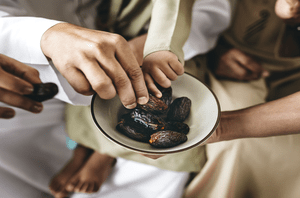“And victory comes only from Allah, the Almighty, the All-Wise” (3:126).
Throughout Islam’s history, Ramaḍān has been the month of victory. A month wherein the religion’s destined heroes were granted victory by Allah al-Naṣīr (The Ultimate Helper). Men who were true to Allah, served His dīn and strived to implement His commands. They honoured their covenant and so Allah aided them, vanquished their enemies and granted Islam victory.
These are the heroes of our history: men who feared Allah, loved Allah and lived for Him. In the day, they fasted and fought valiantly; and at night, they worshipped Him and cried to Him. They were the warriors of the day, monks of the night.
Every year, the 17th of Ramaḍān reminds us of a turning point in history. After many years of persecution, torture, sanctions and exile, the Battle of Badr took place under the blessed leadership of our beloved Prophet Muḥammad ﷺ . It ended with a decisive victory for Islam.
Six years later, in Ramaḍān 8 AH, the door of Islam widened with the Conquest of Makkah. And in Ramaḍān 15 AH, Saʿd b. Abī Waqqāṣ (raḍiy Allāhu ʿanhu) led the Muslims to victory in the Battle of Qādisiyyah, breaking the back of the indomitable Persian Empire, which has not seen pre-eminence since.
Even after the passing of the Companions (radiy Allāhu ʿanhum), Ramaḍān continued to bring victories for the faithful. In 92 AH, the young and ambitious Ṭāriq b. Ziyād conquered the Iberian Peninsula (Andalus), establishing unbroken Muslim rule over it for nearly 800 years.
Several centuries later, in 582 AH, Ramaḍān proved the auspicious month in which the Battle of Ḥiṭṭīn occurred, paving the way for the liberation of al-Quds (Jerusalem) under the leadership of Ṣalāhuddīn al-Ayyūbī. This was followed by a crushing defeat of the Mongols in 658 AH under the courageous leadership of Sayfuddīn Quṭuz in the Battle of ʿAyn Jālūt.
Then and Now
A lot has changed since those days of glory. Today, the Ummah has become accustomed to living under the jackboot of Islam’s enemies who perpetrate relentless tyranny, unchecked crimes and rampant corruption upon it.
And yet still, despite all this physical subjugation, it is another enemy which has today paralysed us. One which has disorientated our minds, killed our spirits, and left us enamoured with our enemies.
It is our mental and cultural defeat. The disbelievers may not occupy our lands anymore, but they occupy our minds and hearts — and this remains our greatest setback.
Enticing ‘progressive’ ideas, debased sensual entertainment and far-reaching media have blurred our faculties. With time, this has created an inferiority complex towards our dīn and towards our native languages, cultures, and dress. A planned and systemic dissemination of their ideas has eroded our core identity and crushed centuries-long values of morality, family and community.
We foolishly imitate the disbelievers’ ways, no matter how absurd, blindly accepting their evil materialism, hedonism and godlessness. Instead of deriving strength and guidance from our revelation and heritage, we seek it from morally degenerate ‘influencers’: well-manicured human devils who steal the minds and innocence of our youth.
Resisting the occupation of one’s land is easier when compared to dajjalic enslavement of our minds. This enslavement cannot be seen, and for many, not even believed. How do you convince the zoo animal, who is well-fed and looked after, that it is still imprisoned?
Only one religion clears the fog.
Islam Offers Another Way
As believers, it is our duty to live for Allah, and establish His dīn on His earth. Rather than blindly following what popular culture feeds us, we should reflect on the damage that materialism, hedonism and liberalism have wreaked on the psychological, social, economic and spiritual states of humanity. We should ask ourselves what values and norms we are imbibing as we zombie scroll through our social media feeds and TV channels.
We should feel and inspire in ourselves and in our youth a sense of honour (ʿizzah) for the incredible gift of Islam. We should feel privileged at being given īmān, and scared that it could be taken away from us at any time. We should strive hard to serve the dīn of Allah, and remain steadfast on whatever hurdles come in our way.
“We were indeed the most disgraced of all people. Allah honoured and elevated us through Islam. If we seek honour from anything besides that with which Allah honoured us, Allah will disgrace us.” -ʿUmar b. al-Khaṭṭāb
Victory is only from Allah. If He decrees for it to be given and the whole world decides otherwise, we will receive it. If He decrees for it not to be given to us and the whole world decides otherwise, we will not receive it. And victory will come with īmān: a firm and sincere belief in Allah. It will come when the Ummah decides to collectively return back to Allah, strive hard to obey Him, and become beacons of justice, mercy and integrity.
The Prerequisites of Victory
The following are some prerequisites of victory which Allah has mentioned in the Qur’ān:
Iman and righteous deeds
Firm belief in Allah, righteous deeds, worshipping Allah, and staying away from shirk are all prerequisites of victory. Allah ﷻ says, “Allah has promised those of you who believe and do good deeds that He will certainly make them successors in the land, as He did with those before them; and will surely establish for them their religion which He has chosen for them; and will indeed change their fear into security — (provided that) they worship Me, associating nothing with Me…” (24:55).
Fear of Allah
Another prerequisite is taqwā (piety) and the fear of Allah. Allah ﷻ says, “And We will surely make you reside in the land after them. This is for whoever fears standing before Me and fears My warning” (14:14).
Encouraging the good and forbidding the evil
Establishing ṣalāh, paying zakāh, encouraging what is good and forbidding the evil all lead to victory. Allah ﷻ says, “(They are) those who, if We give them authority in the land, they establish prayer, pay zakah, encourage what is good, and forbid what is evil. And with Allah rests the outcome of all matters” (22:41).
The Messenger of Allah ﷺ said, “By the one in whose Hand is my soul, you will encourage good and forbid evil or else Allah will soon send a punishment from Him upon you. Then you will supplicate to Allah and it will not be accepted” (Tirmidhī).
Sabr
A key prerequisite to victory is ṣabr. Allah ﷻ says, “Indeed, Messengers before you were rejected but patiently endured rejection and persecution until Our help came to them. And no one can alter the promises of Allah…” (6:34).
Sabr is not passive resignation. Sabr is hard work, sacrifice and perseverance. It is never giving up despite the odds.
Helping the din of Allah
Helping the dīn of Allah with sincerity (ikhlāṣ) brings about victory. Allah says, “Believers! If you help the dīn of Allah, He will help you and make you stand firm.” (47:7) Al-Saʿdī (raḥimahullāh) says, “This is a command from Allah to the believers to support the cause of Allah by establishing His dīn, doing daʿwah, and fighting His enemies, all for the sake of Allah.”
The ummah has to prepare on many different levels for victory. Everyone can play a role, and we should never belittle any action taken for this pursuit.
Physical and material preparation accompanied by tawakkul
Allah has commanded the believers to adopt the physical and material means. Allah ﷻ says, “Prepare against them whatever force you can …” (8:60). At the same time, their hearts should be attached to Allah, and not the physical means. Allah says, “If Allah helps you, none can defeat you. But if He denies you help, then who else can help you? The believers should put their trust in Allah Alone” (3:160).
Dhikr
The remembrance of Allah is one of the most powerful sources of strength. Allah says, “Believers! When you encounter a group (in battle), stand firm and remember Allah abundantly, so you may triumph.” (8:45)
Dhikr increases one’s awe and fear of Allah. It removes unhealthy fears and give one courage to face extremely challenging circumstances. When Allah instructed Mūsā and Hārūn (ʿalayhimas-salām) to go and confront Pharoah, he said: “Go, you and your brother, with My signs and do not slacken in My remembrance.” (20:42) They were told to arm themselves with dhikr for this momentous task ahead of them. Dhikr lightens burdens, makes it easier to sacrifice, and attaches one’s heart to Allah.
The Victory-Blockers
There are certain actions which prevent the help of Allah from arriving. These include:
Sins
Allah (ʿazza wa jall) says, “Indeed, Allah will not change the condition of a people until they change what is in themselves…” (13:11). Just as collective obedience leads to victory, collective disobedience leads to Allah removing the peace and prosperity of a nation.
While sins are dangerous, the public display of them is lethal. We should be very careful of making our sins public, as Allah will forgive everyone from the Ummah of Muḥammad ﷺ except for those who made their sins public.
Despair
It is easy to look around the Ummah and feel depressed and hopeless. However, Allah reminds us, “Do not lose heart, and do not grieve, for you will have the upper hand, if you are (true) believers” (3:139).
We are an Ummah of hope. Despite all the odds, we work to bring peace, justice and goodness to the world. We don’t give up. If the Prophet ﷺ and his companions had this defeatist mentality in the Battle of Badr, today we would not have Islam and lā ilāha illā-Allāh.
We may see victory in our lifetime or we may not. However, we should never give up. Instead, we should try our utmost to pave the way for future generations. We must plant trees knowing that we’ll never sit under their shade.
Diseases of the Heart
Many of our predicaments – including the lack of unity – are caused by the diseases of our hearts, including envy, pride, ostentation, cowardice, stinginess, greed, and selfishness. Not only do these form a barrier between us and Allah, but they also prevent us from being productive members of the Ummah.
The Messenger of Allah ﷺ said, “The goodness of the earlier generations of this Ummah is due to their zuhd and yaqīn; and the latter generation of this Ummah will be ruined because of shuḥḥ (stinginess and greed) and false hopes” (Bayhaqī).
Love of the World
One of the key blockers of victory and the root cause of our humiliation is the love of the world. The Prophet ﷺ said, “The nations will soon summon one another to attack you just as diners invite one another to share their dish.” Someone asked, “Will it be due to our small number at the time?” He ﷺ replied, “No, there will be many of you at the time, but you will be like the froth and scum of a flood. Allah will remove from your enemies’ hearts their fear of you, and He will cast wahn into your hearts.
Someone asked, “O Messenger of Allah, what is wahn?” He ﷺ replied, “Love of the world and a dislike of death” (Abū Dāwūd).
Infighting
A key victory-blocker is infighting and disunity. Allah (ʿazza wa jall) says, “Obey Allah and His Messenger and do not quarrel with one another, lest you lose heart and your moral courage. And persevere, for surely Allah is with those who persevere” (8:46).
Ramaḍān is a symbol of unity. Throughout the year, ṣalāh in congregation reminds us of the cohesiveness, brotherhood and unity we are supposed to enjoy as an Ummah. In Ramaḍān, this is further amplified as we gather together in the masjid for tarāwīḥ and often partake in ifṭār and suḥūr with our fellow believers.
In Ramaḍān, we collectively increase our worship of Allah and feel a sense of unity as we all fast in this month. This feeling of love, brotherhood and unity should transcend into the rest of our lives and months of the year.
For unity to occur on a macro-level, we need to focus on what we can individually do on a micro-scale. We all have a circle of influence that we can focus on, starting off with ourselves. The first step is to strive to end disagreements and fighting within one’s immediate family. Then we should focus on reducing friction in our social circles, neighbours, institutions and so on.
We should leave aside pettiness and aimless theological wrangling to specialists, and instead focus on issues which are of pressing need. Instead of squabbling over the moon sighting, let us fill our hearts with love and awe for the Lord of the moon. Instead of bickering over whether we are celebrating Eid on the correct day, let us ensure that we spend Ramaḍān in a manner whereby Allah releases us from the Hell-fire, warranting for us truly a day of Eid and celebration!
Instead of focusing on fitnah, let us increase our īmān in Allah, increase in our ʿibādah, and let us serve His creation. Let us occupy ourselves with what will bring Allah’s help and victory.
May Allah al-ʿAzīz (The Exalted in Might) grant honour and victory to the Ummah of Muḥammad ﷺ. May Allah al-Mawlā (The Protective Ally) protect us from all harm and make us reliant on Him Alone.






